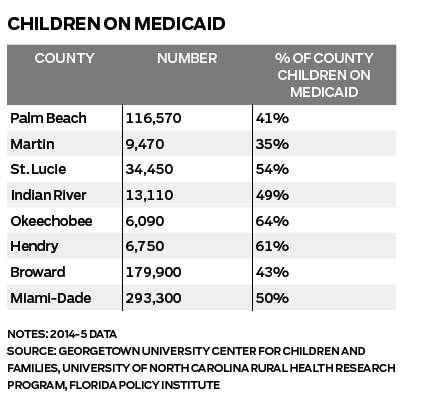POST ON HEALTH CHILDREN
Medicaid cuts hit 116,570 area kids
Program covers 41 percent of Palm Beach County children.
By Charles Elmore Palm Beach Post Staff Writer
As Florida legislators voted to reduce Medicaid spending by $521 million Friday, a new report shed light on who is affected by budget battles in Tallahassee and Washington: Medicaid covers 41 percent of Palm Beach County children, or more than 116,000.
That’s up from about 76,000, or 27 percent of the county’s children, six years earlier, according to research presented by Georgetown University, the University of North Carolina and the Florida Policy Institute.
Since 2008-09, the number of children lacking insurance in Palm Beach County was cut almost in half to 24,480 by 2014-15, researchers said.
Medicaid covers an even bigger share of children in rural counties, including 64 percent in Okeechobee County.
Medicaid provides “critical access to lifesaving treatment and protection from rising health care costs to many children and families,” said Joan Alker, executive director of the Georgetown University Center for Children and Families. “Cuts to Medicaid and other health care programs would take those protections away from many and risk financial ruin, denial of health care or both.”
Despite pleas from hospitals, a special session that concluded Friday saw state legislators trim $521 million, counting state and matching federal money.
Medicaid ensures care for more than 4 million low-income children, pregnant women, disabled and elderly Floridians, noted Florida Hospital Association President Bruce Rueben. As the session wound down, he asked legislators to focus on “the critical priority of providing care for our state’s most vulnerable citizens.”
On Friday, Gov. Rick Scott called the budget “a major win for Florida families,” noting per-pupil spending, for example, reached an all-time high.
In April, Scott said the Trump administration pledged to provide other federal money to help hospitals, $1.5 billion in Low Income Pool funding.
“It is great to have a partner in Washington who is willing to work with us to help our state,” Scott said then. “Florida was on the front line of fighting against federal overreach under President Obama, and it is refreshing to now have a federal government that treats us fairly and does not attempt to coerce us into expanding Medicaid.”
Asked about proposed reductions in Medicaid spending for hospitals June 2, Scott said: “I used to run the largest hospital system in the country and I think it’s important our health care system is properly funded. Our hospitals, as you know, are doing extremely well financially. They generate over $4 billion worth of profits a year.”
The Senate tried to restore some Medicaid funding, but House Speaker Richard Corcoran, R-Land O’Lakes, said Thursday: “We’re very happy with where we are with the funding for hospitals that we did. I think they’ll be fine.”
Florida ranks 49th in the nation in Medicaid spending per capita on children, $1,816, according to the Kaiser Family Foundation. The U.S. average is $2,602 and five states spend more than twice what Florida does per child. Florida is also 49th in spending per capita for all Medicaid recipients.
The American Health Care Act passed by the U.S. House would cut more than $800 billion from Medicaid over a decade compared with leaving the Affordable Care Act intact, the Congressional Budget Office said. The Senate is considering the biggest legislative issue of President Donald Trump’s early term now.
U.S. Rep. Brian Mast, R-Palm City, faced a stream of questions about the AHCA in a town hall meeting in Stuart last week. He told questioners Medicaid spending will still go up and that what are called reductions include a winding down of Medicaid expansion that Florida chose not to pursue in the first place: “This is not a cut.”
Critics of the House bill say that Floridians on Medicaid stand to lose if funding is capped and handed to the states in block grants.
“Florida can’t afford it,” U.S. Rep. Lois Frankel, D-West Palm Beach, said in March. “Seventy percent of folks in nursing homes are paid by Medicaid. Half the childbirths are paid by Medicaid.”
If Florida’s Medicaid money from the U.S. government had been capped to grow no more than the inflation rate from 2001 to 2011, the state would have received 17 percent less money than it actually got, the Kaiser Family Foundation calculated in March.
The point was to show the challenges of trying to cap spending for a growing state with new people moving in, or living longer, or needing more services than forecast, researchers said. Florida would have been among the 10 states hit hardest with billions of dollars in shortfalls, the analysis said, forcing tough choices to cut coverage or services, slash other spending or raise taxes.
“Cutting funding to Medicaid and changing its financing structure into a per-capita cap or block grant would hit children the hardest, damaging their overall well-being and future quality of life as adults,” said Joseph F. Pennisi, executive director of the Lake Mary-based Florida Policy Institute. It calls itself a “common sense” think tank promoting general prosperity.
Overall, 57 percent of children in Florida’s small towns and rural areas receive Medicaid coverage and 44 percent do so in urban areas, researchers estimated.
“When Florida children and families have health insurance coverage, the whole state benefits,” Pennisi said. “Providing greater access to care can equate to fewer visits to emergency rooms, less uncompensated care and more people getting — and staying — healthy.” celmore@pbpost.com
